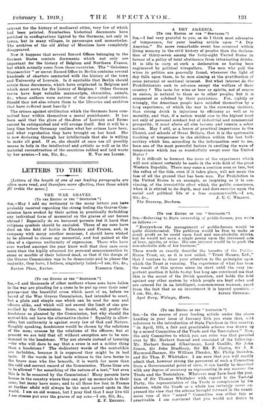[To THE EDITOR or THE SPECIATOR."3 and thousands of other
mothers whose eons have fallen in the war are pleading for a cross to be put up over their sone' graves—not the beautiful cross which most of 118, before we heard of the War Graves Commission, had intended to erect, but a plain and simple one which can be used for men and officers alike, and which will not exceed the limit of size pre- scribed by the Commission. Some, no doubt, will prefer the headstone as planned by the Commission, but why should the next-of-kin not have the alternative choice ? Equality is allow- able; but uniformity is against every law of God and Nature. Roughly speaking, headstones would be chosen by the relations of the men; crosses by the relations of the officers; but at present we are told that all without exception are to be con- demned to the headstone. Why not elevate instead of lowering —for who will dare to say that a cross is not a nobler thing than a headstone ? The dedicatory words of the nextaf-kin aro forbidden, because it is supposed they might be in bad taste. If the words in bad taste witness to the love borne to the brave man who lies beneath, it is worth far more than the cold and correct record of the Commission. Three lines are to be allowed " for something of the nature of a text," but even this ie to be censored by the Commission I Many parents have homes in the country where they can put up memorials to their eons; but many have none; and to all those few feet in France or further afield will always be the moat sacred spots in the world. I am an old woman, but I pray God that I may live till I see crosses put over the graves of my sons.—I am, Sir, Be., E. F. WINNEDY.


































 Previous page
Previous page